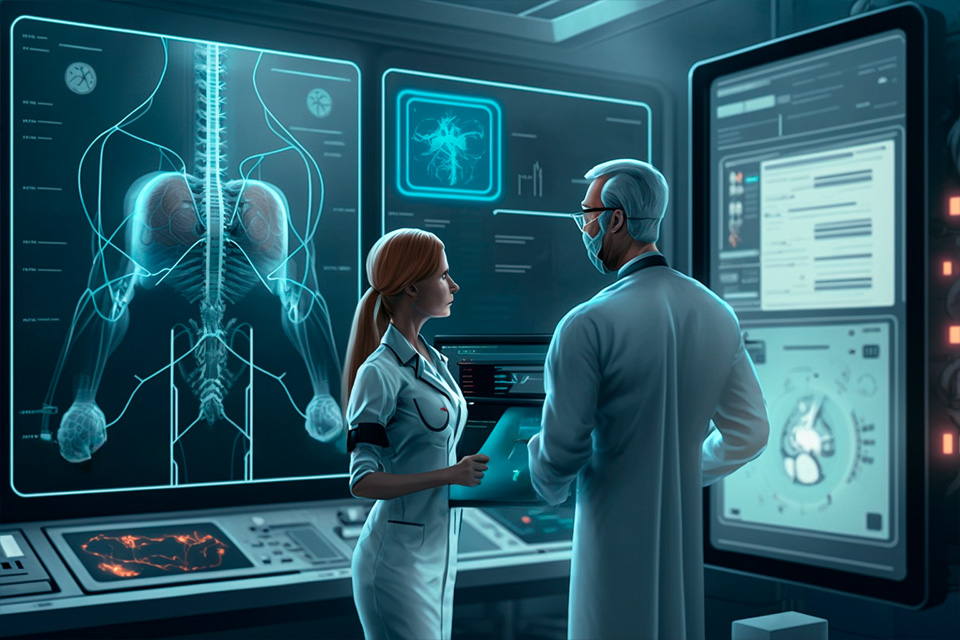Technological advancements are playing a significant role in revolutionizing healthcare industry. One such technology that has impacted the healthcare industry greatly is Artificial Intelligence. AI technology is used in several ways to improve the healthcare industry, from drug development to clinical operations to data management. The impact of AI in healthcare is genuinely life-changing, as it is driving innovations in diagnostics, patient engagement, and administrative and operational efficiency. In this article, we will delve deeper into how AI is revolutionizing healthcare with five tools used in hospitals and clinics.
The Power of Machine Learning in Disease Diagnosis
“Machine Learning diagnosis is already being used extensively in pathology and oncology, and has been shown to have accuracy levels comparable to experienced physicians. In some cases, it has even outperformed human doctors in diagnosing diseases correctly.
Ali Hashemi, chairman and co-founder of GluCare Integrated Diabetes Center in Dubai, emphasizes that AI is just a tool in a healthcare professional’s toolkit, and its value lies in the actionable insights it provides for clinicians and patients. Besides aiding in accurate disease detection and diagnosis, AI is also more cost-efficient than manual healthcare, making medical treatment more accessible for people in developing countries.
In diabetes care, wearable AI devices like wireless-enabled wearable monitors are helping patients monitor their blood sugar levels. AI-powered ophthalmoscopes are being used to detect a degenerative condition called diabetic retinopathy that can cause blindness. According to Hashemi, the precision of this device is almost equivalent to that of an ophthalmologist, with a sensitivity of about 96%.”
Challenges to integrating AI into healthcare
“One of the greatest challenges to integrating AI into healthcare is data governance. AI relies on personal medical data, which, in most countries, remains forbidden to third parties. However, the Covid-19 pandemic has helped shift opinions regarding health data governance, with only 17% of the UK public now against sharing their medical information.
AI and Machine Learning are powerful tools that are revolutionizing healthcare. With continued advancements, these technologies hold great promise for providing better healthcare for more people at a lower cost.”
Five AI Tools Revolutionizing Healthcare Today
“Merative, formerly known as IBM Watson Health, is an AI tool used for medical research, drug discovery, and clinical decision support. This tool provides physicians with evidence-based insights, allowing them to make more informed decisions when treating their patients. Merative uses natural language processing to read vast amounts of medical literature, which is impossible for humans to accomplish. Additionally, it also analyzes patient data and provides personalized treatment recommendations.
Viz.ai is an AI tool that helps identify and diagnose acute stroke. This tool can automatically analyze computed tomography (CT) scans to identify and diagnose strokes quickly. Once it detects a possible stroke, Viz.ai alerts the neurologist, allowing them to review the CT scan and begin treatment faster. This tool has proved to be successful, as it has been shown to reduce the time from stroke onset to treatment by 90 minutes.
Enlitic is an AI tool that uses deep learning to analyze medical images. This tool can quickly and accurately identify abnormalities in X-rays, CT scans, and MRI scans. Enlitic’s deep learning algorithms analyze medical images in real-time, providing physicians with immediate insights that help them make informed decisions. Enlitic’s technology is helping physicians make faster and more accurate diagnoses while reducing the number of missed diagnoses.
Regard is an AI tool that helps physicians identify and manage chronic conditions. This tool uses machine learning algorithms to analyze patient data and identify those at high risk of developing chronic conditions, such as diabetes or heart disease. Additionally, Regard provides physicians with personalized treatment recommendations for their patients, improving patient outcomes and quality of care.
Twill is an AI tool that uses machine learning to optimize clinical trials. This tool analyzes clinical trial data, identifying patterns and insights that can help improve the trial’s design and execution. Twill can help identify patient cohorts and potential risks, allowing for more efficient and effective clinical trials.”
Ways AI is Transforming Healthcare
“Improving Diagnostics
AI technology is helping physicians make faster and more accurate diagnoses by analyzing patient data and medical images. AI tools such as Enlitic and Viz.ai are proving to be successful in identifying and diagnosing conditions such as stroke and identifying abnormalities in medical images.
Advancing Treatment Options
AI technology is helping advance treatment options by providing physicians with personalized treatment recommendations. Tools like Merative analyze vast amounts of medical literature and patient data to provide physicians with evidence-based insights that
“
Conclusion
It is clear that AI is revolutionizing healthcare in many ways, from improving diagnostics to advancing treatment options, boosting patient engagement and adherence, and supporting administrative and operational efficiency. The tools mentioned tools, such as Merative, Viz.ai, Enlitic, Regard, and Twill, are just a few examples of the many AI-powered solutions being used in hospitals and clinics worldwide to enhance patient care and outcomes. As AI technology continues to evolve and be refined, it is likely that we will see even more significant and positive changes in the healthcare industry.
